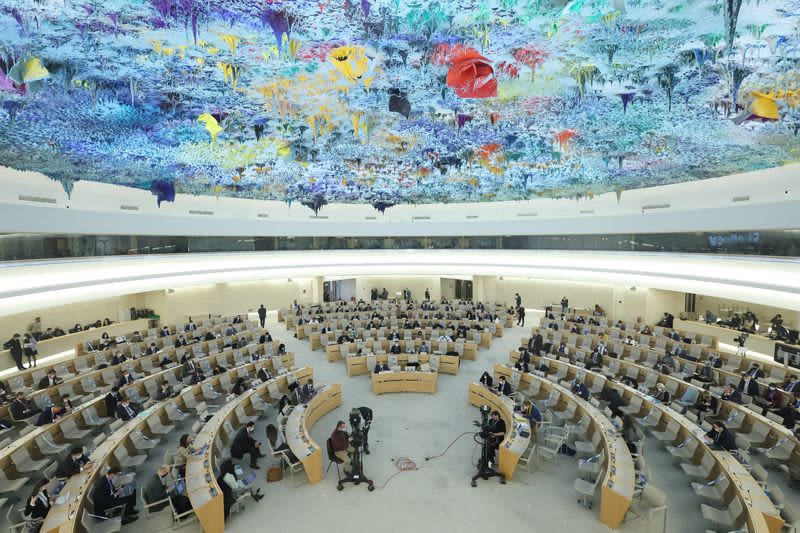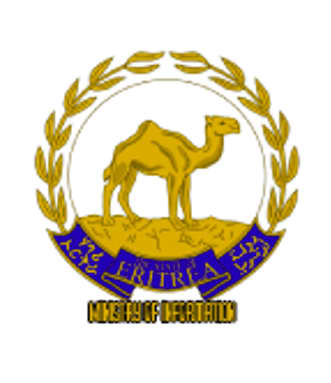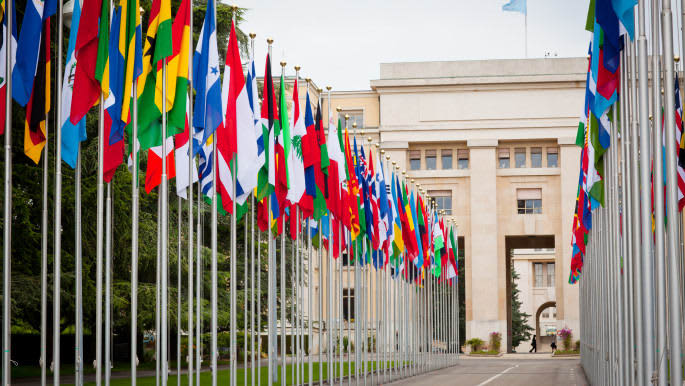WHITE HOUSE — While U.S. President Joe Biden has played a key role in galvanizing Western nations’ condemnation of Moscow’s aggression against Ukraine, his administration is finding it harder to build a global coalition in the Indo-Pacific to isolate Russian President Vladimir Putin.
Key regional partners such as Australia, Japan, South Korea, Singapore and Taiwan have announced significant financial sanctions and export controls against Moscow, but others have resisted Western pressure to even condemn the invasion.
Most notable among these is India. While it is a strong U.S. partner in containing China in the Indo-Pacific, New Delhi relies heavily on Russian defense purchases and abstained from the United Nations General Assembly resolution demanding that Russia “immediately, completely and unconditionally withdraw all of its military forces from the territory of Ukraine within its internationally recognized borders.”
India also abstained on a U.N. Security Council vote (( )) that Russia vetoed.
India’s reluctance
Biden convened an emergency virtual Quad meeting on Thursday, a day after India’s abstention from General Assembly vote. The Quad, an informal grouping of the U.S., India, Australia and Japan, was established mainly to address regional concerns about China’s rise.
India — which relies on Russia militarily in its border disputes with Pakistan and China — is in a predicament, analysts say. While India’s Western allies expect it to uphold the liberal international order and condemn Russian aggression, its regional geopolitical requirements and dependence on Moscow limit its options.
“India cannot overnight stop all purchases — especially of military spare parts — from Russia, but it can show that going forward, it is going to speed up its military modernization and look to other defense partners — U.S., France, Israel, South Korea — instead,” said Aparna Pande, director of Hudson Institute’s Initiative on the Future of India and South Asia.
“This will be especially helpful as the CAATSA sanctions are still on the table when it comes to India’s purchase of [the] S-400 missile system from Russia,” Pande told VOA. He was referring to the 2017 Countering America’s Adversaries Through Sanctions Act — a law allowing sanctions on any country that has “significant transactions with Iran, North Korea or Russia.”
The administration is looking “very closely” at whether those sanctions should be applied to India, Donald Lu, U.S. assistant secretary of state for South Asia, told a Senate subcommittee hearing on Wednesday.
In a signal to Beijing, Quad leaders agreed that what was happening in Ukraine should not be allowed to happen in the Indo-Pacific, according to statements made by the prime ministers of Japan and Australia. The statements are in line with a joint statement issued after the summit that said the leaders had “discussed the ongoing conflict and humanitarian crisis in Ukraine and assessed its broader implications.”
Perhaps evident of New Delhi’s resistance, however, the Quad statement did not mention Russia or use the word “invasion.” The White House has not responded to VOA’s request for more details about the meeting.
Emerging coalition in Indo-Pacific
Australia has targeted sanctions on key Russian banks, institutions and hundreds of individuals, including Russian President Vladimir Putin and his top officials. While Australia is not a NATO member, Canberra said it is providing medical supplies, financial assistance and lethal as well as nonlethal military equipment to Ukraine.
Japan, the world’s third-largest economy, has joined Western allies in blocking major Russian banks from a key international payment network known as SWIFT (Society for Worldwide Interbank Financial Telecommunication); freezing the assets of Putin, his top officials and oligarchs; and tightening export controls, including on semiconductors. It is also imposing sanctions on Belarusian President Alexander Lukashenko and his top officials, condemning the country for allowing Russian troops to enter Ukraine through its territory.
South Korea has announced tighter export controls and joined the SWIFT cutoff of Russian banks. Among the controlled items are electronics, semiconductors and computers; information and communications supplies; sensors and lasers; navigation and avionics technology; and marine and aerospace equipment.
Taiwan, a democratically governed island that Beijing claims as its breakaway province, said it will align with the West on blocking Moscow from SWIFT. Home to the world’s largest semiconductor manufacturer, TSMC, Taipei also announced export control rules on chips.
A fractured ASEAN approach
The Association of Southeast Asian Nations, or ASEAN, has called for an immediate cease-fire and dialogue. While the statement was cautious, some observers say it’s notable that ASEAN, known for its principle of noninterference and neutrality toward major powers, even put out a statement at all. Still, it did not name Russia.
“The invasion should have alerted Southeast Asian policymakers because it tells us that international law, economic interdependence and confidence-building norms exercise — all key features of ASEAN’s regional order — are not sufficient to prevent an outright aggression,” Evan Laksmana, an Indo-Pacific security expert at the National University of Singapore, told VOA Khmer.
“More than the violation of principles Southeast Asian states claim to be sacrosanct, the invasion also tells us that gray zone tactics that major powers use — whether in Ukraine or South China Sea — may be a prelude to an outright war rather than an alternative to it.”
Some ASEAN members, however, have broken with the group and found their own voice in condemning Moscow. Most notably Singapore, which has announced financial sanctions and export controls on items that can be used as weapons against Ukrainians.
Others have released statements condemning the invasion but have not applied punitive measures. Indonesia, the largest Southeast Asian country, has condemned it as “unacceptable” but also did not mention Russia in its official statement. Nor did the Philippines and Brunei.
Other ASEAN members did not release individual statements but have joined the March 2 U.N. General Assembly resolution overwhelmingly supported by 141 countries.
“Mainly (it’s) the democratic states and those that are most closely aligned with the West, who are explicitly on their own condemning the invasion,” said Gregory Poling, director of the Southeast Asia Program at the Center for Strategic and International Studies. “Then you’ve got Malaysia and Thailand and Cambodia, who are only doing it under cover of the U.N.,” he told VOA.
In addition to Russia, four countries — Belarus, North Korea, Eritrea and Syria — voted against the U.N. resolution, and 35 countries abstained, including the ASEAN countries of Vietnam and Laos.
“Vietnam is stuck in a tough position here where its entire military is running on Russian hardware,” Poling said. “Laos was much more in the Soviet camp than other parties and still does have a very close strategic relationship with Russia.”
Myanmar’s representative at the U.N., acting on behalf of the government in exile, voted yes on the resolution against Russia.
However, the junta in Naypyidaw has thrown its support behind Moscow. “Russia has worked to consolidate its sovereignty,” General Zaw Min Tun, a spokesperson for Myanmar’s military council, said in an interview with VOA Burmese. He said the support is “the right thing to do” to show that “Russia is a world power.”
“The Myanmar junta has become close to Moscow, so it isn’t surprising that it is praising the Russian war effort,” Joshua Kurlantzick, senior fellow for Southeast Asia at the Council on Foreign Relations, told VOA.
One reason for ASEAN’s fracture is the effort of individual countries to maintain a balance of power in the region.
“Most ASEAN member states use their relationships with Russia partly to offset the strength of China in the region,” said Aaron Connelly, senior fellow at the International Institute for Strategic Studies. “Many of them are loath to break relations with Russia because it’s part of the way that they diversify their relationships in the world.”
While ASEAN is limited in its geopolitical clout, Connelly pointed out that later this year ASEAN chair Cambodia will host the East Asia Summit, Thailand will host the Asia-Pacific Economic Cooperation, and Indonesia will host the G-20. All those forums include Russia, and if conflict persists, host countries will come under enormous pressure from Western countries to ban Moscow from the meetings.
Meanwhile, China has been careful to neither explicitly endorse nor condemn the Russian invasion. Analysts say Beijing is eyeing the Ukraine crisis with concern, however, and would prefer to see it peacefully resolved.
“The Chinese are risk averse, and if this crisis has taught them anything, it is that there are dire consequences to pay for doing stupid things,” said Sergey Radchenko, Wilson E. Schmidt Distinguished Professor at the Johns Hopkins School of Advanced International Studies.
“Putin has staked Russia’s future on this conflict, and he seems to be losing at the moment,” he told VOA. “Beijing is therefore looking for ways to bring Russia to its senses, perhaps through mediation.”
Source: Voice of America



